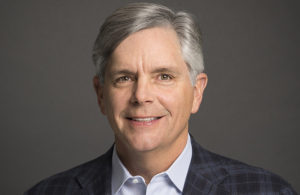
GE CEO Larry Culp [Photo courtesy of GE]
Medical device makers and suppliers seeking relief from the global semiconductor shortage will have to hold on a while longer.
GE (NYSE:GE) is warning investors that supply and labor shortages are squeezing its Healthcare business this quarter, and that the pressure won’t likely let up in 2021.
GE’s Healthcare business “largely is a supply chain story right now,” GE Chair and CEO Larry Culp said this week, specifically citing semiconductors, resin and logistics as supply chain barriers to meeting “strong, if not robust” demand.
“It has been a bit of a whack-a-mole game in making sure we’ve got what we need to fulfill demand at the levels we’d like to. … We’re really engaging that challenge on a daily basis,” he said Tuesday at the Morgan Stanley Laguna Conference.
The Boston-based conglomerate recently warned those supply constraints “may impact timing of delivery in the second half” of the year for GE Healthcare, and could hurt GE’s third-quarter earnings and cash.
“Worldwide material and labor availability remain pressured on several fronts, particularity across semi-conductors, resins and logistics,” GE VP of Investor Relations Steve Winoker wrote last week in an update for investors. “We are experiencing sustained pressure in our Healthcare business in 3Q, which we expect to continue through the second half of the year, negatively impacting revenue and margin growth. Although we expect a challenging environment through the first half of 2022, we are working with our partners, suppliers, and logistics channels to alleviate the impact and help mitigate output and cost challenges.”
Like Culp, Winoker said demand remains strong for the Healthcare business, and GE is encouraged by the performance and long-term prospects of its healthcare products and services despite the shortages and COVID-19 pandemic challenges.
Winoker said GE remains “committed to our full-year guidance of low-to-mid-single-digit revenue growth in Healthcare,” and he and Culp both said they still expect at least 1 percent organic margin growth from GE Healthcare.